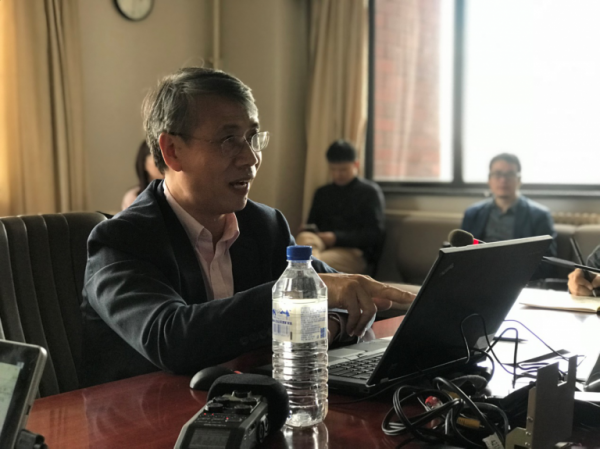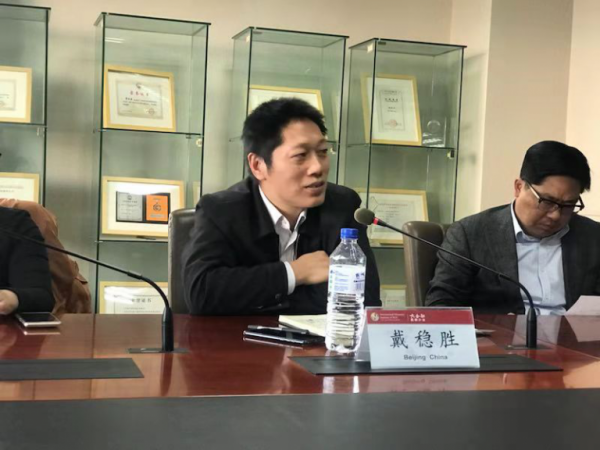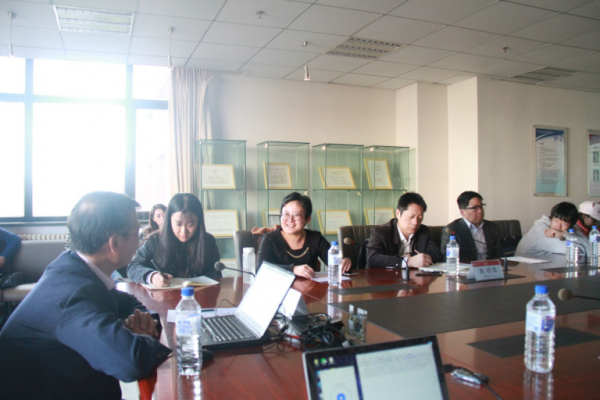Macro-Finance Salon (No.101): A Quantitative Analysis of Sino-US Trade Relations and Current Problems
2018-10-10 IMI Dr. Wang Wei went straight to the topic from the start, analyzed why it is called “Sino-US trade friction” instead of “Sino-US trade war” from four perspectives: goods trade deficit of the US, the background of Trump’s election, the rise of China and the personality of Trump, and introduced the background of Sino-US trade conflicts. Then he analyzed current problems in Sino-US trade, and the Sino-US trade relations from such perspectives as the trade of goods, the trade of services, the composition of trade and trade partners; teased out measures and strategies adopted by China and the US respectively to respond to trade conflicts. By referring to a large amount of data, he also analyzed the trades between China and some major countries and regions from a global perspective, and proposed China’s development ideas in the future under the background of Sino-US trade friction. Finally, Dr. Wang Wei summarized that the Sino-US trade friction is the first step in the gaming between China and the US, and it will bring both challenges and opportunities to China; in addition, China is not only capable of winning this trade war, but also needs to make full use of the opportunities brought by the Sino-US trade friction to realize the upgrade of opening-up and industries, optimize its economic structure, and handle international relations well to better integrate itself into the international community.
Dr. Wang Wei went straight to the topic from the start, analyzed why it is called “Sino-US trade friction” instead of “Sino-US trade war” from four perspectives: goods trade deficit of the US, the background of Trump’s election, the rise of China and the personality of Trump, and introduced the background of Sino-US trade conflicts. Then he analyzed current problems in Sino-US trade, and the Sino-US trade relations from such perspectives as the trade of goods, the trade of services, the composition of trade and trade partners; teased out measures and strategies adopted by China and the US respectively to respond to trade conflicts. By referring to a large amount of data, he also analyzed the trades between China and some major countries and regions from a global perspective, and proposed China’s development ideas in the future under the background of Sino-US trade friction. Finally, Dr. Wang Wei summarized that the Sino-US trade friction is the first step in the gaming between China and the US, and it will bring both challenges and opportunities to China; in addition, China is not only capable of winning this trade war, but also needs to make full use of the opportunities brought by the Sino-US trade friction to realize the upgrade of opening-up and industries, optimize its economic structure, and handle international relations well to better integrate itself into the international community.
 Regarding China-US trade conflicts, Professor Dai Wensheng analyzed the two countries’ trading history as well as the advantages and disadvantages of China’s economy based on his own research. He then pointed out that in the context of the trade conflict, the key is where China’s economy is going. He also stressed that China’s economy has its own inherent advantages and that we should still be confident in its future.
Regarding China-US trade conflicts, Professor Dai Wensheng analyzed the two countries’ trading history as well as the advantages and disadvantages of China’s economy based on his own research. He then pointed out that in the context of the trade conflict, the key is where China’s economy is going. He also stressed that China’s economy has its own inherent advantages and that we should still be confident in its future.
 During the discussion, the guests exchanged many thoughts with each other and with Dr. Wang Wei. They discussed multiple issues, including the impact of China-US trade conflict on the future of China's economy and the possibility of a shift in the international trade landscape. Dr. Wang Wei gave detail explanations on these issues.
The Macro-Finance Salon is a high-level academic salon jointly organized by the International Monetary Institute and Monetary and Financial Department, School of Finance, Renmin University of China. The salon has four categories: Policy Experts, Academic Experts, Business Elites and Young Scholars. Based on China's and the world's practices, it has built a high-level, professional and open platform for academic exchanges in order to promote the development of "Macro-Finance" disciplines in the new era and to carry out the "Macro-Finance" theories, policies and strategy researches. The concept of "Macro-Finance" originated in the basic idea of the combination of macro and micro financial theory advocated by Professor Huang Da. It conceptually originated the systematic idea of an inseparable whole of the financial and the real part of economy. Chen Yulu, PBoC's Deputy Governor, systematically demonstrated the basic connotation and methodology of "Macro-Finance" in his book, The Outline of Big Finance, and built a "Macro-Finance" that is conducive to long-term economic growth and national compacity. The concept is supported by both theories and evidence.
During the discussion, the guests exchanged many thoughts with each other and with Dr. Wang Wei. They discussed multiple issues, including the impact of China-US trade conflict on the future of China's economy and the possibility of a shift in the international trade landscape. Dr. Wang Wei gave detail explanations on these issues.
The Macro-Finance Salon is a high-level academic salon jointly organized by the International Monetary Institute and Monetary and Financial Department, School of Finance, Renmin University of China. The salon has four categories: Policy Experts, Academic Experts, Business Elites and Young Scholars. Based on China's and the world's practices, it has built a high-level, professional and open platform for academic exchanges in order to promote the development of "Macro-Finance" disciplines in the new era and to carry out the "Macro-Finance" theories, policies and strategy researches. The concept of "Macro-Finance" originated in the basic idea of the combination of macro and micro financial theory advocated by Professor Huang Da. It conceptually originated the systematic idea of an inseparable whole of the financial and the real part of economy. Chen Yulu, PBoC's Deputy Governor, systematically demonstrated the basic connotation and methodology of "Macro-Finance" in his book, The Outline of Big Finance, and built a "Macro-Finance" that is conducive to long-term economic growth and national compacity. The concept is supported by both theories and evidence.
